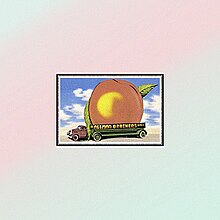| Eat a Peach | ||||
|---|---|---|---|---|
 | ||||
| Studio album / Live album by | ||||
| Released | February 12, 1972 | |||
| Recorded |
| |||
| Venue | Fillmore East (New York City) | |||
| Studio | Criteria (Miami) | |||
| Genre | ||||
| Length | 68:42 | |||
| Label | Capricorn | |||
| Producer | Tom Dowd | |||
| The Allman Brothers Band chronology | ||||
| ||||
| Singles from Eat a Peach | ||||
| ||||
Eat a Peach is the third studio album and the first double album by American rock band the Allman Brothers Band. Produced by Tom Dowd, the album was released on February 12, 1972, in the United States by Capricorn Records. It was the band's fourth album since their debut The Allman Brothers Band in 1969; released as a double album, it constitutes both their third studio album and second live album, containing a mix of live and studio recordings released in 1972. Following their artistic and commercial breakthrough with the July 1971 release of the live album At Fillmore East, the Allman Brothers Band got to work on their third studio album. Drug use among the band became an increasing problem, and at least one member underwent rehab for heroin addiction. On October 29, 1971, lead and slide guitarist Duane Allman, group leader and founder, was killed in a motorcycle accident in the band's adopted hometown of Macon, Georgia, making it the final album to feature him.
Eat a Peach contains studio recordings from September–December 1971 at Criteria Studios, Miami—both with and without Duane Allman—and live recordings from the band's famed 1971 Fillmore East performances. The album contains the extended half-hour-long "Mountain Jam", which was long enough to take up two full sides of the original double-LP. Other highlights include vocalist Gregg Allman's performance of his brother's favorite song, "Melissa", plus Dickey Betts' "Blue Sky", which went on to become a classic rock radio staple. The album artwork was created by W. David Powell and J. F. Holmes at Wonder Graphics, and depicts the band's name on a peach truck, in addition to a large gatefold mural of mushrooms and fairies. The album's title came from a quote by Duane Allman: "You can't help the revolution, because there's just evolution ... Every time I'm in Georgia, I eat a peach for peace".[1]
On release Eat a Peach was an immediate commercial success and peaked at number four on Billboard's Top 200 Pop Albums chart. The album was later certified platinum and remains a top seller in the band's discography.
- ^ Allman, Galadrielle (2014). Please Be with Me: A Song for My Father. Spiegel & Grau. p. 343. ISBN 978-1-4000-6894-4.